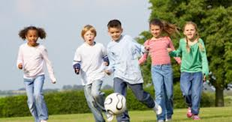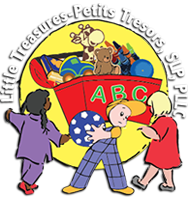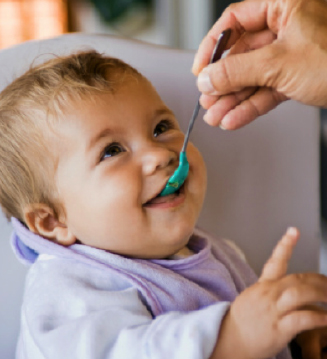Early Detection Leads to Early Intervention:
Parental Resources
Developmental Milestones:
Early Detection Leads to Early Intervention:
Although all children learn and develop differently, others may need extra help. Here is a list of developmental skills normally expected of typical infants three (3) months to three (3) years old:
3 MONTHS
- Turns heads towards bright colors and lights
- Moves both eyes together in the same direction
- Recognizes bottle or breast
- Reacts to sudden noises
- Makes cooing sounds
- Makes fists with both hands
- Grasps toys or hair
- Wiggles or kicks with arms and legs
- Lifts their head and chest when on their stomach
- Smiles
6 MONTHS
- Follows moving objects with their eyes
- Turns toward the source of a normal sound
- Reaches for objects and pick them up
- Switches toys from one hand to the other
- Plays with their toys
- Helps hold the bottle during feeding
- Recognizes familiar faces
- Babbles
12 MONTHS
- Sits without support
- Pulls to a standing position
- Crawls
- Drinks from a cup
- Plays peek-a-boo
- Waves bye-bye
- Holds out their arms and legs while being dressed
- Puts objects in a container
- Stacks two blocks
- Knows five to six words
1 ½ YEARS OLD
- Likes to push, pull and dump things
- Follows simple directions — “bring the ball”
- Pulls off their shoes, socks, and mittens
- Likes to look at pictures
- Makes marks on paper with crayons
- Feeds themselves
- Walks without help
- Steps off a low object and keep their balance
2 YEARS OLD
- Uses two-to-three words sentences
- Says names of toys
- Recognizes familiar pictures
- Carries something while walking
- Feeds themselves with a spoon
- Plays independently
- Turns 2-3 pages at a time
- Likes to imitate their parents
- Identifies hair, eyes, ears, and nose by pointing to them
- Builds a tower of four blocks
- Shows affection
2½ YEARS OLD
- Walks up steps alternating feet
- Rides a tricycle
- Puts on their shoes
- Opens the door
- Turns one page at a time in a book
- Plays with other children for a few minutes
- Repeats common rhymes
- Uses three-to-five words sentences
- Names at least one color correctly
- Toilet trained
Here is a list of developmental skills normally expected of typical developing children from three (3) to five (5) years old:
3 YEARS OLD
- Uses pronouns I, you, and me correctly
- Is using some plurals and past tenses
- Knows at least three prepositions, usually – in, on, under
- Knows chief parts of the body and should be able to point to them
- Handles three-word sentences easily
- Uses around 900-1000 words
- About 90% of what child says should be intelligible
- Starts using verbs predominantly
- Understands most simple questions dealing with his environment and activities
- Relates his/her experiences so that he/she can be followed with reason
- Able to reason out such questions like “what you should do when you are sleepy, hungry, cool, or thirsty?”
- Should be able to answer questions about his/her gender, name and age
4 YEARS OLD
- Knows the names of familiar animals
- Can use at least four prepositions or can demonstrate his/her understanding of their meaning when given
commands
- Names common objects in picture books or magazines
- Knows one or more colors
- Can repeat 4 digits when they are given slowly
- Can usually repeat four syllable words
- Often indulges in make believe
- Talks about activities he/she is doing
- Understands such concepts as longer and larger when they are shown in contrast
- Readily follows simple commands like “go get the ball” when the ball is not in sight
- Can use descriptive words spontaneously
- Can count to ten
- Speech should be completely intelligible in spite of articulation problems

Behaviors Characterized by Autistic Children
Communication problems may include:
- Cannot start or maintain a social conversation
- Communicates with gestures instead of words
- Develops language slowly or not at all
- Does not adjust gaze to look at objects that others are looking at
- Does not refer to self correctly (for example, says “you want water” when the child means “I want water”)
- Does not point to direct others’ attention to objects (occurs in the first 14 months of life)
- Repeats words or memorized passages, such as commercials
- Uses confusing rhyming
Social interaction:
- Does not make friends
- Does not play interactive games
- Is withdrawn
- May not respond to eye contact or smiles, or may avoid eye contact
- May treat others as if they are objects
- Prefers to spend time alone, rather than with others
- Shows a lack of empathy
Response to sensory information:
- Does not startle at loud noises
- Has heightened or low senses of sight, hearing, touch, smell, or taste
- May find normal noises painful and hold hands over ears
- May withdraw from physical contact because it is over stimulating or overwhelming
- Rubs surfaces, mouths or licks objects
- Seems to have a heightened or low response to pain
Play:
- Doesn’t imitate the actions of others
- Prefers solitary or ritualistic play
- Shows little pretend or imaginative play
Behaviors:
- “Acts up” with intense tantrums
- Gets stuck on a single topic or task (perseveration)
- Has a short attention span
- Has very narrow interests
- Is overactive or very passive
- Shows aggression to others or self
- Shows a strong need for sameness
- Uses repetitive body movements

Parental Involvement is the Key
Parental Involvement is the Key
During each step of the therapeutic/educational process, parental involvement is essential and will be encouraged. Parents will be trained to become an intrinsic and vital part of the intervention process of meeting their children’s needs. Parents know their own children best and must play an essential role in that child’s instructional programs/overall goals. It is crucial to include parents as active participants to ensure that the outcomes, goals, and strategies most important to the family are incorporated into the intervention.
Parental Resources
LINKS:
Autism Spectrum Disorder
http://www.webmd.com/brain/autism/autism-spectrum-disorders
Recognizing Developmental Delays in children
http://www.webmd.com/parenting/baby/recognizing-developmental-delays-birth-age-2
Hearing Impairment in children
http://kidshealth.org/parent/general/eyes/hear.html
Gross and fine motor delays in children
http://www.whattoexpect.com/developmental-delays-in-children/fine-motor-delays-and-gross-motor-delays-in-toddlers.aspx
NYS Department of Health (DOH)
http://www.health.ny.gov/community/infants_children/early_intervention/
NYC Department of Education
http://schools.nyc.gov/default.htm

